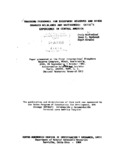| dc.description.abstract | This paper describes the key role of the wildlands and Watershed Program (WWP) of the Tropical Agricultural Research and Training Center (CATIE) in contributing to improved wildlands and watershed management in Central America. CATIE's and WWP's objectives and principle activities are cutlined and the vital role played by training in WWP's strategic regional approach is explained. The tested and proven design and main characteristics of WWP's training strategy and program are highlighted, including its regional emphasis, support to development of national training programs, target groups, major types of activities, curricula, instructional methods and materials, linkages between activities, trainee selection process and instructors. The relative advantages and disadvantages are outlined for the different types of activities, including mobile seminars, short courses, workshops, in-service training and the post-graduate M.Sc. program at CATIE. The WWP training program's relationship to other national and international ones is reviewed and the vital support and collaboration provided by the large number of national agencies and bilateral and multilateral aid and conservation organizations is explained. The differences and similarities between the WWP training program and similar efforts in other regions are reviewed, and the program's cost effectiveness, appropriateness to local problems and situations, integrated approach to solving resource management problems, emphasis on practical experience, and strategic focus are highlighted. The major problems facing WWP in meeting training needs in Central America -- lack of adequate personnel and insufficient core budget -- are discussed. Finally, the importance of integrated, multinational training programs within the context of the World Conservation Strategy, MAB and World Heritage Program is stressed. | es_ES |


